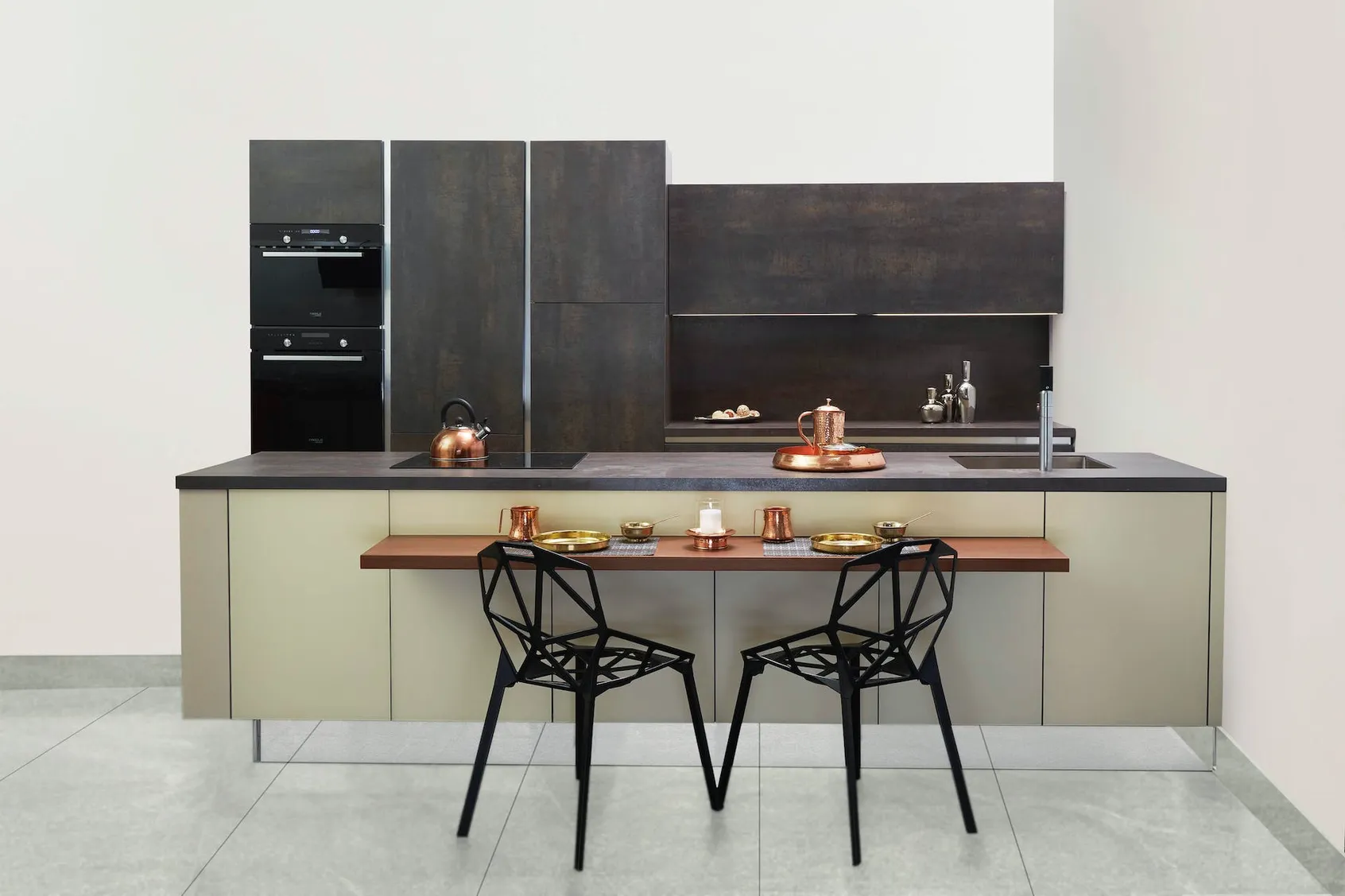Smoke detectors are important safety devices used to detect the presence of smoke in the air, which can signal the presence of a fire. Therefore, it is important to consider the question, should you put a smoke detector in the kitchen?
This article will discuss the pros and cons of installing a smoke detector in the kitchen and guide for making the decision.
Should You Put A Smoke Detector In The Kitchen?
Yes, it is recommended to put a smoke detector in the kitchen. Cooking is one of the leading causes of house fires, so having a smoke detector in the kitchen can provide early warning in case of a fire.
However, it is essential to place the smoke detector away from the stove or oven to avoid false alarms from cooking fumes. A good location is on the ceiling or high on a wall, at least a few feet from cooking appliances. Additionally, it is essential to regularly test and replace the batteries in the smoke detector to ensure it is functioning properly.
First and foremost, installing a smoke detector in the kitchen is important because it can detect any smoke or fire that may occur in the kitchen. Smoke detectors are designed to detect smoke particles when the smoke exceeds a certain level and will then sound an alarm to alert the home’s occupants that a fire is occurring.
This allows the occupants to take the necessary steps to evacuate their homes and call the fire department. Without a smoke detector, it is possible for a fire to go undetected for some time, thus increasing the chances of injury or death due to smoke inhalation or burns.
Second, having a smoke detector in the kitchen can also help to prevent a fire from occurring in the first place. Smoke detectors provide an early warning system and can detect small fires before they become out of control. This allows the occupants to take the necessary steps to address the fire and prevent it from spreading.
Finally, a smoke detector in the kitchen is important for insurance. Most insurance companies will require that a smoke detector be installed to cover any damage that may occur in the event of a fire. By installing a smoke detector in the kitchen, homeowners can have peace of mind knowing that their home is properly protected and their insurance coverage will help cover any losses incurred due to a fire.

Benefits Of Installing A Smoke Detector In The Kitchen
Installing a smoke detector in the kitchen is extremely important for fire safety and can offer several benefits, including:
- Early detection of fires: Smoke detectors are designed to detect smoke and alert you to a potential fire before it gets out of control. This early warning can save lives and prevent extensive property damage.
- Quick response time: Smoke detectors are equipped with loud alarms that can alert everyone in the house to the presence of smoke. This allows people to evacuate the area and call for help quickly.
- Meeting safety regulations: Many building codes require that homes have smoke detectors installed in specific locations, including the kitchen. By installing a smoke detector, you will comply with safety regulations and also ensure the safety of your family and visitors.
- Affordable investment: Smoke detectors are relatively inexpensive, making them cost-effective for homeowners. The benefits they provide regarding safety and property protection make them essential for any home.
What Types Of Smoke Detectors Are Best Suited For The Kitchen?
When installing smoke detectors in the kitchen, it is important to choose the right type. Smoke detectors are the first line of defense against fires in the home, and the kitchen is one of the most common places for fires to start.
The best type of smoke detector for the kitchen is designed for the kitchen environment. This type of detector is more sensitive to the smoke produced by cooking fires and is a better choice than a standard smoke detector.
The most common type of smoke detector for the kitchen is a photoelectric smoke detector. This type of detector uses a light beam to detect smoke particles in the air. The beam is sensitive enough to detect even the smallest particles of smoke that can be produced by cooking, such as when a pot or pan is left on the stove for too long. This type of detector is also less prone to false alarms, as it is designed to detect only smoke from real fires, not from burning food.
Another type of smoke detector suitable for the kitchen is an ionization smoke detector. This type of detector uses an ionization chamber to detect smoke particles. The chamber is filled with a small amount of radioactive material, which helps it to detect even the tiniest particles of smoke in the air. This type of detector is more sensitive than the photoelectric detector but is more prone to false alarms, so it is best used in conjunction with a photoelectric detector.
Proper Placement Of Smoke Detectors In The Kitchen
Proper placement of smoke detectors in the kitchen is important to ensure maximum safety. Here are a few tips to consider:
- Install smoke detectors at least 10 feet from cooking appliances to reduce false alarms caused by cooking fumes.
- Mount smoke detectors on the ceiling as close to the center of the room as possible. Smoke rises, so ceiling placement is critical in detecting any potential smoke.
- Consider installing a specialized kitchen smoke detector to differentiate between cooking smoke and actual fire smoke. These detectors are designed to ignore cooking smoke but will still alert you in case of a real fire.
- If your kitchen has high ceilings or is in an open space like a loft, install additional smoke detectors to ensure maximum coverage.
Remember to test your smoke detectors regularly and replace batteries as needed. Proper placement and maintenance of smoke detectors can save lives in a fire emergency.
How Often Should Smoke Detectors Be Tested In The Kitchen?
Smoke detectors are a necessary safety feature for any home, and the kitchen is no exception. Installing smoke detectors in the kitchen is a good idea, as it can alert occupants of a potential fire before it becomes too dangerous.
Smoke detectors should be tested regularly in the kitchen, as kitchen fires can be hazardous due to the presence of flammable items such as cooking oils and electrical appliances. Testing smoke detectors every month is recommended to ensure that they are working properly and can alert occupants to a potential fire.
When testing smoke detectors in the kitchen, it is important to ensure that the detector is working properly and not affected by false alarms. This can be done by pressing and holding the test button on the detector itself. If the detector works correctly, it should beep or chirp when the button is pressed.
It is also important to check that the smoke detector is not affected by steam or smoke from cooking, as this can trigger false alarms. If the detector is affected by steam or smoke, it should be moved to a different location in the kitchen and tested again.
It is also important to remember to replace the batteries in smoke detectors regularly. Batteries should be replaced once a year at a minimum, but more frequently if the detector is in a particularly high-risk area. Batteries can also be tested by pressing and holding the test button. If the detector beeps or chirps, the batteries are working properly; if the detector does not beep or chirp, it is time to replace the batteries.

The Risks Of Not Installing A Smoke Detector In The Kitchen
The risks of not installing a smoke detector in the kitchen are immense. In addition, due to the presence of flammable materials in a kitchen, these fires can spread much faster than other home fires. Installing a smoke detector in the kitchen is the best way to ensure your safety and protect your property from harm.
Not only is a smoke detector in the kitchen an important safety precaution, but it also can serve as a deterrent to potential fire hazards. For example, a smoke detector in the kitchen can remind people to turn off the stove or oven when they are done cooking. It can also remind people to be cautious when cooking with hot oil or grease, as these materials can easily catch fire if not properly monitored. Additionally, the presence of a smoke detector may encourage people to practice safe cooking habits to avoid the risk of a kitchen fire.
In addition to providing an early warning system and a potential deterrent, a smoke detector in the kitchen can also reduce the damage a fire may cause. Smoke detectors can detect smoke and alert people to a potential fire before it can spread.
This can minimize the amount of damage caused by the fire, as well as reduce the amount of time that it takes for firefighters to respond to the incident.
Smoke Detector Maintenance Tips For The Kitchen
It’s important to keep your smoke detector in good working order throughout your home, especially in the kitchen. Here are some tips to help you maintain your smoke detector in the kitchen:
- Clean your smoke detector regularly. Use a vacuum or soft brush attachment to remove dust and debris from your smoke detector.
- Test your smoke detector monthly. Press the test button on your smoke detector to ensure the battery works properly.
- Replace your smoke detector batteries annually. This is important to ensure that your smoke detector is functioning properly.
- Place your smoke detector in the right location. Smoke detectors should be placed on the ceiling or high on the wall, away from obstructions or corners.
- Keep your kitchen clean. Grease buildup and cooking residue can trigger your smoke detector, so keeping your kitchen clean and free of debris is important.
How To Connect Smoke Detectors In The Kitchen?
Connecting smoke detectors in the kitchen can be tricky, as cooking smoke can often trigger false alarms. Here are some tips for properly connecting smoke detectors in the kitchen:
- Look for smoke detectors designed for use in the kitchen. These detectors often come equipped with sensitivity settings that can be adjusted specifically for cooking smoke.
- Install the smoke detectors at least 10 feet away from cooking appliances. This will help prevent false alarms while still ensuring that the detectors can detect smoke in the event of a real fire.
- Consider installing a heat detector in the kitchen as well. Heat detectors are designed to detect high temperatures, which can signal a fire in progress before smoke is present.
- Test your smoke detectors regularly to ensure they are working properly. This can be done by using the “test” button on the detector or using smoke from a smoke detector testing spray.
What To Do If A Smoke Detector Alarms In The Kitchen?
The first step is determining if the alarm is due to a real or false fire. If the alarm is false, you can reset the detector by pressing the reset button or replacing the battery. If the alarm is due to a real fire, you should immediately evacuate the building and call the fire department.
Once you have evacuated the building and are in a safe area outside, you can take further steps to prevent the spread of the fire. If you have a fire extinguisher, you can try to extinguish the fire. If you do not have an extinguisher, you can try to contain the fire by closing doors and windows and using a blanket to block smoke and heat.
If the fire is too big to contain, you should move away from the building and call the fire department. You should also contact your local fire department to report the fire and provide them with the exact location of the fire.
Lastly, if the fire is contained or extinguished, you should have the detector checked by a professional. If the detector malfunctions, it could be because of a faulty battery or connection. It is important to check the detector to avoid future false alarms or failure to detect fires.

Choosing The Right Smoke Detector For The Kitchen
When selecting a smoke detector for your kitchen, choosing one designed specifically for this area is essential. This is because kitchens can be a source of false alarms due to cooking activities such as grilling and frying, which can produce smoke and steam. Here are some factors to consider when choosing the right smoke detector for your kitchen:
- Look for a detector with a photoelectric sensor: This type of sensor is more sensitive to smoldering fires, which are more common in the kitchen.
- Consider a detector with a hush feature: This feature allows you to silence false alarms quickly by pressing a button or using a mobile app.
- Choose a detector that is easily accessible: It’s essential to install a smoke detector in an area where you can quickly reach it to silence false alarms or replace batteries.
- Opt for a hardwired detector: If your home has a hardwired smoke detector system, consider adding a photoelectric detector to the kitchen. This will ensure that all detectors work together, and the alarm will sound throughout the house if necessary.
- Avoid ionization sensors: Ionization sensors are less effective in detecting smoldering fires and are more sensitive to cooking fumes, which can cause false alarms.
How To Troubleshoot Smoke Detector Issues In The Kitchen?
If your smoke detector in the kitchen is giving off false alarms or seems not to be working properly, here are some troubleshooting tips you can try:
- Ensure that the smoke detector is installed in the proper location in your kitchen. It may be too sensitive to heat and smoke if it’s too close to the stove or oven.
- Check the battery or power source. Make sure the battery is fresh and properly installed. If it’s hard-wired, check the electrical connections to ensure they are secure.
- Clean the smoke detector. Over time, dust and debris can accumulate in the smoke detector and affect its operation. Use a soft brush or vacuum to clean the unit gently.
- Test the smoke detector. Follow the manufacturer’s instructions to test the unit and ensure it functions properly.
- Consider purchasing a specialized smoke detector for the kitchen. Some smoke detectors are designed specifically for use in the kitchen and are less likely to give off false alarms.
If these troubleshooting steps don’t solve the issue, replace the smoke detector with a new one. Always follow the manufacturer’s guidelines for installation and maintenance.
Where To Put A Smoke Detector In The Kitchen?
The ideal location for a smoke detector in the kitchen is in the ceiling, near the middle of the room. This is because smoke tends to rise, and the smoke detector will be able to detect it quickly. A smoke detector near cooking appliances, such as ovens and stoves, is also a good idea. This will help to alert you if a fire starts in these areas.
It is also important to keep the smoke detector away from any potential sources of false alarms. This includes areas near windows and doors, as the drafts created by them might set off the smoke detector. Additionally, you should avoid placing the smoke detector near fans or vents, as this could also set off false alarms.
Finally, it is important to ensure the smoke detector is installed correctly. This includes ensuring the batteries are working correctly and the smoke detector is mounted securely. Additionally, it is a good idea to test the smoke detector regularly to ensure it functions correctly.
Residential Smoke Detector Requirements
When considering residential smoke detector requirements, a smoke detector should be installed in the kitchen. Smoke detectors are essential to any fire safety system, and the kitchen is one of the most dangerous places in the home regarding fire risk. The smoke detector should be installed near the ceiling and tested regularly to ensure it functions properly.
Smoke detectors are designed to detect smoke and alert the home’s occupants during a fire. They are typically equipped with an alarm that will sound in the event of a fire, alerting those inside the home to the danger. Smoke detectors are also designed to detect small amounts of smoke, alerting occupants to a fire before it can spread. The alarm will sound even if the smoke levels are still too low to be seen by the human eye.
Smoke detectors are important to any fire safety system, and local regulations must install them. Depending on the area, there may be specific requirements for smoke detectors, such as placing multiple detectors in certain home areas. In general, smoke detectors should be installed in each bedroom, hallway, stairwell, and kitchen.
The kitchen is particularly important for smoke detectors, as it is a fire hotspot. It is close to common sources of fire, such as stoves, ovens, and microwaves, as well as potential fuel sources, such as cooking oils and other liquids. Having a smoke detector in the kitchen will ensure that occupants are alerted to a potential fire before it has a chance to spread throughout the home.
Should There Be A Smoke Detector In Every Room?
Smoke detectors are important to any home safety plan, but should they be in every room? The answer is yes. Every room in the home should have at least one smoke detector. This includes the kitchen, one of the most common sources of indoor fires.
The kitchen is a high-risk area for fires due to hot surfaces, open flames, and combustible materials. A smoke detector in the kitchen can provide early warning of a fire, giving you and your family time to evacuate the home and call for help.
The placement of a smoke detector in the kitchen is important. It should be installed high on the wall, near the ceiling, and away from cooking appliances. This will help ensure that the smoke detector is not obstructed by steam or smoke from cooking activities. Additionally, it should be located near the door leading out of the kitchen to detect smoke from any fires that might start in other rooms.
When installing a smoke detector in the kitchen, it is important to ensure it is certified by a recognized testing laboratory. The smoke detector should also be tested regularly to ensure it functions properly. Additionally, it should be replaced at least once every ten years.
Finally, it is important to remember that a smoke detector is only part of a comprehensive fire safety plan. It is also important to practice fire safety in the kitchen, such as never leaving cooking appliances unattended and always ensuring that any open flames are extinguished before leaving the room.
No Smoke Alarm In The Kitchen
When it comes to smoke detectors, there is much debate about whether or not they should be installed in the kitchen. There are several reasons why a smoke alarm may not be installed in the kitchen:
- False alarms: Smoke alarms in the kitchen may be triggered by cooking fumes, resulting in frequent false alarms. This can frustrate homeowners and may lead them to remove the smoke alarm.
- Placement issues: The placement of smoke alarms in the kitchen can be difficult due to the presence of cooking appliances and cabinets. Smoke alarms should be installed on the ceiling, away from this obstruction, to detect smoke effectively.
- Kitchen size: A smoke alarm may be unnecessary if a kitchen is small enough to detect smoke easily from an adjacent room.
- Personal preference: Some homeowners may choose not to install smoke alarms in the kitchen, believing they can detect smoke and react to a fire quickly without one. However, it’s important to note that smoke alarms can provide early warning and increase the likelihood of a safe escape in case of a fire.
Conclusion
In conclusion, installing a smoke detector in the kitchen is highly recommended. Smoke detectors can alert you to the presence of smoke, which could mean there is a fire.
They are important safety devices that can help save lives in a fire emergency. Smoke detectors should be installed in the kitchen to ensure the safety of everyone in the home.
Frequently Asked Questions:
Where should smoke detectors be placed in the kitchen?
Smoke detectors should be placed in the kitchen near the ceiling or on the wall opposite the kitchen doorway. They should be placed at least 10 feet away from any cooking appliance and from areas that could accumulate steam or smoke.
Do you need a smoke alarm in the kitchen?
Yes, it is recommended to install a smoke alarm in your kitchen.
Where should you not put a smoke detector?
You should not put a smoke detector near fireplaces, stoves, or an area with excess moisture, such as a bathroom or laundry room.
Why are there no smoke detectors in the kitchen?
Smoke detectors are not typically installed in kitchens because the false alarms triggered by cooking smoke can be disruptive and inconvenient. Additionally, cooking smoke is usually not hazardous to one’s health and is not considered a fire hazard. Smoke alarms should be installed in hallways, bedrooms, and other home areas where fires are more likely to occur.
What types of smoke detectors are best for the kitchen?
The best type of smoke detector for the kitchen is a combination of photoelectric and ionization detectors. This type of smoke detector will detect flaming and smoldering fires, making it perfect for the kitchen. Additionally, this type of smoke detector is less prone to false alarms caused by cooking fumes.
Is it necessary to install a smoke detector in the kitchen?
Yes, it is necessary to install a smoke detector in the kitchen. Smoke detectors can help alert you to smoke and fire in the kitchen, allowing you to take action quickly and potentially save lives.
Are smoke detectors effective in detecting smoke and fires in the kitchen?
Yes, smoke detectors effectively detect smoke and fires in the kitchen. Smoke detectors have sensors specially designed to detect the smoke and heat generated by a fire, and they can trigger an alarm to notify people of a potential fire in the kitchen.
How often should I check and replace the smoke detector in the kitchen?
You should check and replace the smoke detector in the kitchen every six months. You should also test the smoke detector monthly to ensure it functions properly.
